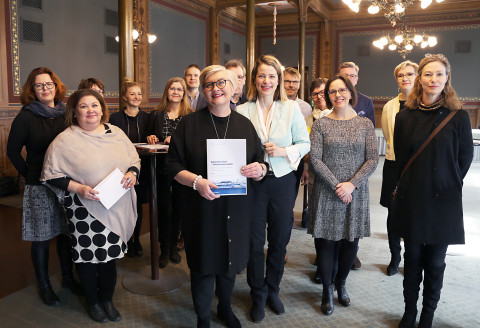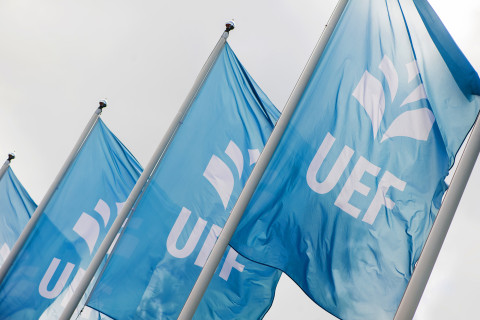“You don’t always have to make a research breakthrough to make a difference. Even lesser findings count.”
This is how Postdoctoral Researcher Kristiina Korjonen-Kuusipuro describes her two-year post on the Digi arkeen Advisory Board addressing digitalisation in everyday life, appointed by the Finnish Ministry of Finance. Researchers and research-based knowledge play an important role in the Advisory Board’s work. At the same time, researchers have had to adapt to a rhythm and culture of work that is quite different from academia.
At the request of the Minister of Local Government and Public Reforms, the Advisory Board explores the consequences of digitalisation on society. The Advisory Board also serves as a platform for dialogue between NGOs, public servants and researchers, and Korjonen-Kuusipuro is one of the five researchers on board. The Advisory Board is considered a novel forum for discourse and it approaches digitalisation from the viewpoint of the humanities in particular.
“We submitted our report in March to the then Minister of Local Government and Public Reforms Anu Vehviläinen. The work of the Advisory Board will, however, continue until the end of the year.”
Digitalisation was identified as one of the key projects of Finland’s previous government.
“As public services began to be heavily digitalised, this raised plenty of concern over how all citizens could keep up with the change. That concern led to the setting up of the Advisory Board.”
Around that time, Korjonen-Kuusipuro and her colleague Tiina Suopajärvi happened to publish an opinion piece on the challenges of digitalisation in Talouselämä, a nationwide newspaper dealing with financial issues.
“I believe that opinion piece is the very reason I was invited to the Advisory Board. I was so surprised by the invitation that I thought it was a prank at first. I was, of course, very pleased and gladly accepted the invitation.”
At UEF, Korjonen-Kuusipuro participates in the ACCESS – Supporting digital literacy and appropriation of ICT by older people project, which is led by Professor Eija Kärnä and funded by the Academy of Finland. The project constitutes part of the EU’s More Years Better Lives programme.
Findings with impact
According to Korjonen-Kuusipuro, working for the Advisory Board has offered a vantage point to how research can influence decision-making.
“Things have really moved forward through the Advisory Board. It has been great to notice that it is easy to get the attention of the minister. This is a prime example of social impact, which is also what research strives for.”
According to Korjonen-Kuusipuro, it has been an eye-opening experience to see how much background research public servants put into the matters they are preparing.
“And this knowledge gets quickly shared via various networks. Small and even mundane observations made by the Advisory Board may well find their way into the minister’s speech in the following week. Research findings, even preliminary ones, are important and, when well justified, they are easily accepted.”
Decisions tend to be made and prepared on a tight schedule, and this is why Korjonen-Kuusipuro thinks it is important for researchers to have the courage to talk about their findings, even preliminary ones.
“The requirements and foundations of academic publishing are different from this type of work. For me as a researcher, this feels like uncharted territory, but one must have faith in the small, yet important observations made, even when they haven’t been studied exhaustively yet.“
Digital skills are civic skills
What, then, are the conclusions made by the Advisory Board regarding the digital leap?
“One of the main observations of our report was that there is a need for further research into the consequences of digitalisation, as there is no such thing as a standard user of digital services.”
All age groups have people who are sovereign users of digital services, and all age groups have people who are at risk of getting left behind.
“In my view, digitalisation should be approached from the viewpoint of inequality in particular. One important observation by the Advisory Board is that digitalisation must not become a source of displacement; instead, everyone must be able to be part of society.”
Studies show that the rapid pace of change and the constant need to learn new things cause tremendous anxiety in some people. Digital skills, and the new technology that follows, have become a new civic skill.
“No matter the type of research into digitalisation – be it qualitative, quantitative, based on statistics or everyday observations, the bottom line is that we need more of it on all levels.”
Plenty of studies into digitalisation are currently ongoing from a variety of perspectives but, unfortunately, they are scattered and isolated from one another.
“It is important to find a common platform for this line of research in order to better raise awareness of ongoing research and research findings, and to make them available to support decision-making. This research-based knowledge happens to concern us all.”

